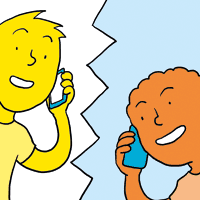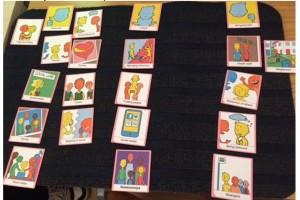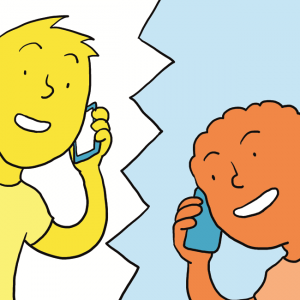Our first Talking Mats advanced online module has launched. We are pleased we had developed our online foundation training well before lockdown. There has been such great feedback from people who have completed our online foundation course and they have been asking for more. They like the bite size chunks, being able to pace their own learning and the reflective practice approach. Now we are adding to our online course with an advanced Talking Mats module focusing on Talking Mats use in safeguarding. This course is structured around the Talking Mats Keeping Safe resource and how to use it.
The Keeping Safe Talking Mats resource was developed to check in with people and find out how their lives are going. It uses a holistic framework to do this and the conversation it supports is structured around three topics: 1) well-being; 2) relationships; 3) thoughts and feelings. The resource was trialled and tested in projects involving over 700 practitioners. Originally, it was designed for people with learning disabilities but feedback has been that it has been helpful with a wide range of people including, those with stroke, head injury, dementia and mental health issues.
The advanced online module involves 2 to 3 hours of learning that you do at your own time and pace. It involves short talks, reading, videos and reflective practice activities. You will develop confidence in using the resource as well as an understanding of relevant issues, such as diagnostic overshadowing, developing the capacity of individuals to raise concerns, the impact of trauma. You will be encouraged to reflect on how you can apply the Talking Mats Keeping Safe resource to your own area of practice
To apply for the course, you must have completed your foundation Talking Mats training. If you haven’t completed this training book now – there is still the reduced price training offer if you book your place before the end of August 2020. Access to this advanced course will begin on the first of every month and you will have the full month to complete it.
Book your place now. The cost is £85 for the course and the Keeping Safe resource and £35 if you already have your Keeping Safe resource and just want to do the training.
‘For every pound invested in the Talking Mats Keeping Safe resource and training there is a potential saving to services of £23.00’ .This was the findings of a cost benefit analysis carried out during the development phase of the Keeping Safe Talking Mat resource. A Cost-benefit analysis demonstrates the overall economic value of an intervention with numbers and evidence.
The Keeping Safe resource
The Keeping Safe resource is a visual framework that has been developed and trialled over 6 years in partnership and with funding from various organisations e.g. Survivor Scotland, Scottish government , Kingdome Abuse survivors project and NHS Fife
The Keeping Safe resource provides:
- A listening space for people with learning disability and communication difficulties to raise concerns and express their point of view.
- A structure for staff to find out what people are thinking about their lives, and raise issues that can be difficult to discuss.
A reflective practice training was developed and provided to over 700 staff to allow staff become familiar and confident with using the the resource
Findings of the cost benefit intervention
There is a significant financial advantage to services using Talking Mats. Analysis of six scenarios found that for each pound invested in the Keeping Safe training there is a potential saving to public services of £23.00. In learning disability services it is easy for costs to accelerate quickly. If services don’t respond effectively, challenging behaviours can escalate and relationships and placements are at increased risk of breakdown. Talking Mats can help provide staff with a comprehensive and accessible framework to help them listen to people who can find it difficult to articulate what is really going on for them e.g. issues of pain, relationships or levels of support. In this project 89% of Talking Mats resulted in staff learning new information about the person they were working with, even when they thought they knew them well. The Talking Mats framework provides a way to turn these points of views into actions that can be monitored and reviewed. It is these early interventions that not only save money but improve quality of life.
Cost benefit Process
With support from Inspiring Scotland a cost benefit analysis was done that examined the cost of the Talking Mats intervention and any resulting actions. 6 cases were chosen from over 100 detailed descriptions of how practitioners working with people with learning disabilities had used the resource. These descriptions represented a cross spectrum of people with learning disabilities in Scotland in terms of living situations e.g. living at home , in supported settings and an inpatients facility . They were also chosen to represent the comorbid conditions that often exist with learning disability e.g. autism, mental health and cerebral palsy. An alternative scenario was created and tested with critical friends as to the likelihood of what might have happened without the Talking Mats intervention. All the scenarios that were developed are available here 20180110 scenarios cost benefit The primary source of financial information and the subsequent calculations was the Unit Costs of Health and Social Care produced by the Personal Social Services Research Unit (PSSRU) 2015/16 . This contains detailed cost estimates for a range of services such as care placements, NHS services, social work, mental health, and family interventions. This analysis can only be illustrative as assumptions are subjective.
The findings from our final report 160512 Keeping Safe report 2013-2016 showed that effective use of the resource not only led to improvements to quality of life for individuals but that it can save services money. Book a place on our webinar and get the Keeping Safe resource 20180122 Keeping Safe Webinar or if face to face discussion is more your thing attend the advanced course in April 2018 – you get the resource with that booking too!
The Talking Mats Keeping Safe Learning Disability projects ends but a resource that promotes safeguarding and well-being continues.
The Keeping Safe Talking Mat provides a structured framework to ask someone ’How’s your life going? We are grateful to the Scottish Government Keys to Life monies for funding the trials. Impact of use of the resource was gained by practitioners sending in examples of their use of Keeping Safe, and the outcomes and actions from the Mats were themed.
The resource has been shown as a helpful way to
- discuss new information (89%). Staff frequently commented that using the Mats revealed things they had not known previously.
- discuss and resolve fears (84%) . It provided a framework that was supportive for those more difficult and or sensitive conversations e.g.’ Usually when she expresses her feelings she can get either upset or angry. She did not get upset or angry at any point through doing the Talking Mats, although the subject and things she was saying was at times difficult issues.’
- support thinking (89%) ‘It helps with memory and attention as she has something visual to keep her focused.’

Initially many staff thought using the resource would take too much time but in fact were really surprised to find how much quality information they got in a short space of time. A cost benefit analysis demonstrated that using the Keeping Safe resource is cost effective for organisations i.e. for every £1.00 an organisation spends on the training and the resource, the potential financial benefit to the organisation is £23.00. We believe this is because the Mats create a powerful listening space and so that issues can be addressed timeously and not spiral out of control. This has not only a financial benefit but also a return in terms of an individual’s well-being and access to local non specialist services.
Although this resource was developed with adults with a learning disability, several people have reported that they have found it useful with other client groups e.g. adults with acquired neurological disorders and young people particularly with mental health issues .
If you want to read in more detail about the design process behind the resource then please read this journal article published in the Tizard Learning Disability Review More Than Pictures TLDR 2017
The Keeping Safe Talking Mat resource provides a structured framework to ask someone ’How’s your life going? It has 3 topics: Your Well-being; Relationships; Thoughts and Feelings
Do you find it difficult discussing feelings with people who have limited understanding?
Do you have limited time to discuss sensitive issues with people?
Do you want to find out any issues which may be slowing recovery or preventing someone moving forward in life?
A cost benefit analysis demonstrated that using the Keeping Safe resource to create a listening space for people to think and share how their lives are going, is cost effective for organisations.
The design of the resource is described in the Tizard Learning Disability Review More Than Pictures TLDR 2017
It has been trialled and tested with people with learning disabilities throughout Scotland, but has also been used effectively with a range of people who find it difficult to discuss their life e.g. Young people with mental health condition.
It has been shown as a helpful way to
- discuss new information (89%),
- discuss and resolve fears (84%)
- support thinking (89%)
This poster gives an overview of the project KS 2nd Poster (click to enlarge)
The Thoughts and Feelings topic uses a different top scale and this resource is best used by people who have completed Talking Mats Foundation Training. If you want to buy it (£55.00 +VAT) contact the office www.talkingmats.com tel. (+44) 01786 479511
The Scottish Government has granted further funding for the Keeping Safe Talking Mats training and resources.
This extension coincides with the launch of the Keeping Safe report 2013-2016 at a seminar on Thursday 19th May at the Raploch Community Centre Stirling. It’s great to hold our event during Learning Disability week where the theme is Celebrating Success. This project has undoubtedly been a success. 234 Keeping Safe communication resources are in use across Scotland. Staff who have used the Keeping Safe resource report that it supports Safeguarding and helps people think how their life is going, enabling them to express concerns they might have, either big or small. The impact that the resource has on the lives of people with learning disability is powerful. You can read more about this in our previous blog or in the Keeping Safe report 2013-2016
The seminar on the 19th of May is an opportunity to share experiences and explore further some of the issues that exist for people with learning disabilities.
The next tranche of funding provides more training courses for:
- People who work with adults with learning disabilities in Scotland to learn the skills and use the resource to support listening to their service users and
- The staff who use the resource regularly to become Keeping Safe trainers and support the aim of ensuring adults with a learning disability in Scotland have access to this communication tool. We particularly want to target geographical areas that do not yet have Keeping Safe trainers, e.g. Dumfries and Galloway and Aberdeenshire.
If you work with adults with learning disabilities in Scotland and would like to apply for Keeping Safe training please contact the office info@talkingmats.com Application for
Striling course 19th August and 16th September is here; 20160610 training flier
Aberdeen Course 9th September and 7th of October is here 20160909 Aberdeen flier
Dumfries and Galloway course 20th October and 25th November is here 20161027 training flier
Further courses are being planned in the Autumn in Dumfries and Central Belt .Please contact Info@talkingmats.com if you wish to be sent the relevant flyer
It is important that we ask people with learning disability about their lives and enable them to raise any concerns. Over the past couple of years we have been developing a Talking Mat called Keeping Safe. It is a resource that gives people time to think about various aspects of their lives, and express how it is going for them.
234 staff in different parts of Scotland now have the resource and have been trained to use it. Feedback includes that using the Keeping Safe resource can improve the quality of communication for both the person with a learning disability and the staff member in the following ways :
- Staff frequently commented that using the Mats revealed things they had not known previously;
‘It gave so much information which we did not expect. It will assist in Adult Support and Protection feedback. It gave him his own say in things.’
‘allowed needs to be identified that I would not have thought to ask about, such as the smoking and taking drugs.’
- It enabled staff have a conversation about more sensitive and or difficult issues;
‘Usually when she expresses her feelings she can get either upset or angry. She did not get upset or angry at any point through doing the Talking Mats, although the subject and things she was saying was at times difficult issues.’
‘A has good communication skills but as we had a sensitive issue (personal care) to discuss I felt that a talking mat would allow us to explore this.’
- It also helped the thinker ( the thinker is the person doing the mat ) to express their thoughts clearly
‘allowed this person to disclose things that they were struggling to disclose verbally.’
- It helped with memory difficulties and kept the thinker focused on the topic
‘It helps with memory and attention as she has something visual to keep her focused.’
- The information gained reflected the thinker’s view and not the views of those around them
‘This resource gave this gentleman the power to say exactly what he was thinking and not what he thought someone wanted to hear.’
- There was a lot of positive feedback on using the resource from people with learning disabilities
‘I adore this. The mats really helped me speak about my feelings.’
- It was a quick way to get information. Initially many staff thought using the resource would take too much time but in fact were surprised to find how much information they got in a short space of time.
The stories gathered from using the resource are powerful and a final report is being prepared which will be launched at a seminar on the 19th May during learning disability week . There are still some spaces on the seminar so if you would like to attend please contact info@talkingmats.com .
We are delighted that the Scottish Government is funding a further round of Keeping Safe Talking Mats training. If you work with adults with learning disability in Scotland, and would like to apply to a Keeping Safe Talking Mats training course then please email us for dates and the application form.
The Keeping Safe Talking Mats resource is a visual framework that has been developed and trialled over 3 years. It provides:
- A listening space for people with learning disability to raise concerns
- A structure for staff to find out what people are thinking about their lives, and raise issues that can be difficult to discuss.
We have produced a poster that describes the development of the resource and where we have got to . Please click here to view CM poster 20150825
The Scottish government learning disability strategy keys to life has 4 strategic outcomes for people with learning disability in 2015-2017
- A health life
- Choice and control
- Independence
- Active Citzenship
Using the Keeping safe resource allows people to think about , reflect on and have their say in these areas. We have loved training staff working in learning disability across Scotland to use it. The feedback on how it is being used is very powerful, so watch out for more blogs that will show how it has helped people with a learning disability have a say in changing and determining their lives.
Over the past year we have been funded by the Scottish Government to develop a Talking Mat to enable adults with Learning disabilities to raise issues of concern. We have worked in close partnership with Survivor Scotland and Kingdom Abuse Survivors Project . Together we have developed and trialled a Talking Mat . The final report for this project is here :Talking Mats and Survivor Scotland final Report
This year the Scottish Government recognised the value of using Talking Mats as a conversation framework to enable people with learning disability to reflect on their lives and express their views including raising any areas of concern. One of the key themes from the national Scottish strategy for people with learning difficulties ‘Keys to Life’ is to keep people safe, but it was also recognised that the Talking Mat that had been designed could also help with other themes –
- Helping people with learning disabilities stay in control
- Shift the culture and ensure care is genuinely person centred
- Evidence that the views of people with learning disabilities have been taken into account
- Support people to cope with adversity and loss and enhance resilience
- Address health inequalities and reduce early deaths
The Scottish Government has funded a 3 year project which we are calling Keeping Safe.
This project will
- Produce a new resource based on the feedback from earlier projects This has 3 topics of conversation . Firstly ,How people are feeling about their Health and well-being secondly, their relationships. For people who are able to think and express their views at a more abstract level the resource has a third topic and gives them space to reflect on their thoughts and feelings.
- Train staff in the 14 health boards across Scotland to use Talking Mats and this resource specifically. This training will be provided jointly with KASP so staff can be supported to think through how they respond appropriately to any concerns that may arise
- Ensure that all health board areas have accredited trainers who will be able to lead ongoing training and sustain use of the resource
If you work with adults with learning disabilities in Scotland and would be like to be part of this exciting initiative please contact us at info@talkingmats.com.
My name is Karin Torgny, I’m from Sweden. My background is in journalism and culture studies. I used to work in “The Development Centre for Double Exposure” for many years, and our mission was to improve and spread knowledge about violence against women with disabilities. My special interest during these years was AAC. Today I work for Unicef and in different projects on human rights issues.
A year ago I did my accredited Talking Mats training in Stirling, Scotland. Since then I have given my first course in using Talking Mats when talking about abuse and harm. It was a great experience and an opportunity to work with an enthusiastic group of women who were open and willing to communicate using symbols. They are all in an organisation working with girls/women with intellectual disability exposed to violence and oppression in the name of honour.
I think Talking Mats is a good tool when approaching difficult subjects and I hope to run more courses like this in Sweden in the future. Lately I was interviewed on the Swedish Radio and talked about the use and possibilities with Talking Mats when someone is exposed to harm and abuse.
For those who know Swedish (!), here is a link to that program, http://t.sr.se/1mxZv9W
I am also curious if someone else is doing something similar. If so I would be interested to know more. Send an e-mail to: karin.torgny@gmail.com
Have a look at how Talking Mats has been used in Scotland to support people with a learning disability to disclose issues of concern: Survivor Scotland
Talking Mats has adopted day 69 of the justice for LB Campaign. This campaign was started was after Connor Sparrowhawk drowned in the bath whilst staying in an assessment treatment unit . In the words of his mum Connor was ‘a beautiful, hilarious and loved beyond words dude’. So, after decades of trying to improve services for people with learning disability, closing the long stay hospitals, bringing in person centred approaches, we are left in 2014 with huge inequalities in the health and life opportunities for people with learning disability and life’s like Connor are cut short in such a shocking, unnecessary and untimely manner.
How many more tragic deaths are we going to see before residential services for people with learning disability are going to change? We need to see at the heart of service culture an ability to really listen , put the views of the patient at the heart of planning and see the families as key partners. Sometimes I think people see listening as a ‘soft issue’. Other things get measured but does the quality of listening ever get measured? It should because in my view it is a critical patient safety issue.
Over the last few years I have had the privileged of working with a diverse group of people with a range of communication support needs. They have developed an interactive workbook for NHS Education Scotland. They share their experiences of contact with services to help staff understand how to improve communication and listening skills. They created 10 vision statements for staff of the things that were key to them. They told powerful personal stories to illustrate those statements. The stories illustrate both good and bad practice. You can download the free resource at http://goo.gl/QdOOev .
Listening to people what strikes me time and time again is the lottery of service delivery. There are some great stories where people have received quality treatment and interaction but that is not universal for there are stories where you are left questioning the compassion and humanity of staff in so called ‘caring’ roles. The question for all of us is how we shift the culture so that we can all experience a person centred and listening health service. I hope the energy and impetus of #107 campaign ignites the flame of change so that ‘all dudes’ gets a safe and quality service. If you want to join the campaign then please follow @justiceforLB .
 Online training login
Online training login 







